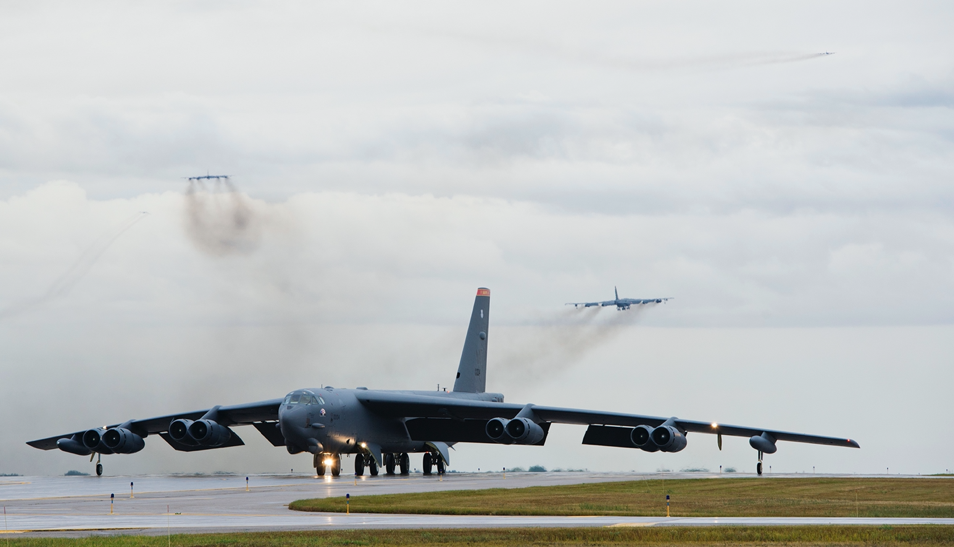For decades, deterrence and the threat of Mutually Assured Destruction (MAD) has kept the onset of an all-out war between the world’s nuclear armed powers at bay. However, there has been debate in the last several years that the United States should abandon its nuclear triad – the combination of bombers, intercontinental ballistic missiles (ICBMs), and submarine launched missiles – and shift to a monad posture. This monad would abandon ICBMS and bombers and consist solely of submarine launched missiles.
Critics of maintaining a nuclear system based on three delivery mechanisms insist that deterrence is still possible with a monad, and that it would save the US billions of dollars. They also posit that nuclear armed submarines are capable of the same functions as ICBMs and bombers. Switching to a submarine-only system and decreasing its nuclear arsenal, though, would cost the US credibility and weaken its deterrence capabilities.
The United States needs to maintain the triad due to its importance to signaling and credibility capabilities and its ability to compete with rising nuclear powers. Each leg of the nuclear triad serves a unique purpose. ICBMs are the cheapest, most reliable leg of the U.S. triad, and they can respond the fastest to a threat. They are also difficult for adversaries to target and destroy.
Heavy bombers can be dispersed throughout the world to increase second strike capabilities while providing a wider range of maneuverability. Bombers serve as visible signals of protection and assurance to more than thirty allies under the nuclear umbrella of the United States because they can be forward deployed in a crisis. Bombers also are efficient signaling mechanisms to adversaries. According to one policy maker, “nothing demonstrates American resolve better than putting fully loaded strategic bombers on alert. The ability to signal in a nuclear crisis is a characteristic found only in the bomber force.”
The largest consequence of abandoning the nuclear triad would be the loss of signaling and flexibility that bombers provide. Bombers are the only leg of the triad that can be recalled quickly, making them strategically irreplaceable in terms of signaling and coercion. Additionally, switching over to a submarine-only approach would counteract the greatest advantage of nuclear submarines: their ability to hide for months at a time. This would be lost if they were to try to take over the signaling capabilities of the bomber.
An additional reason that the United States should maintain its nuclear arsenal stems from the fact that other rising powers are increasing their nuclear capabilities. According to the 2018 Nuclear Posture Review, “[China and Russia] have added new types of nuclear capabilities to their arsenals and increased the salience of nuclear forces in their strategies.” As more states increase their nuclear capabilities, the United States should focus on maintaining its existing arsenal, rather than decreasing it. It would be unwise, and possibly seen as a lack of commitment and credibility, for the United States to be reducing its arsenal and delivery mechanisms while other great powers are focusing on advancing or gaining their nuclear capabilities.
If the US were to reduce its nuclear capabilities, this would threaten the credibility of the United States’ nuclear umbrella. If states relying on the US for protection cannot trust in its nuclear posture, they are likely to start developing their own nuclear weapons programs or turn to the others for protection.
Though many scholars and policy makers are of the view that shifting to a nuclear monad would save the United States billions of dollars, maintaining the triad is critical to the national security of the United States and its allies because the three legs all have unique functions guaranteeing a deadly second-strike response, provide signaling mechanisms to potential adversaries and reassure those under the United States’ nuclear umbrella, and shifting to a monad could be seen as a lack of commitment and credibility.
Rebecca Cooper is a second-year graduate student in the International Security program with a concentration in intelligence. She completed her undergraduate studies at the University of Mississippi with a degree in Political Science and intensive Arabic language study. She currently works at the Terrorism, Transnational Crime, and Corruption Center as a research analyst and administrative assistant. Her primary interests include intelligence, counterterrorism, and Middle Eastern geopolitical issues.
Photo can be found here.




